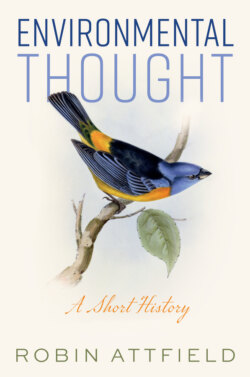Читать книгу Environmental Thought - Robin Attfield - Страница 9
Hesiod and Virgil
ОглавлениеAll ancient civilizations were agrarian, observes J. Donald Hughes (1994: 131), and dependent on agriculture and the soil. (Some, however, could remember a nomadic past.) So it is not surprising that the fifth-century BCE tragedian Sophocles wrote of Earth as the greatest of the gods, from whom the other gods were descended (Antigone, 338–41; Hughes 1994: 130). There are many other passages of the fifth-century tragedians celebrating the Earth as universal Mother, despite recognition of Zeus as the supreme deity.
Nor is it surprising that one of the earliest surviving poems in the Greek language is the poetic guide to farmers (of several centuries earlier than Sophocles) on how to scratch a living from the soil of Boeotia (central Greece), Hesiod’s Works and Days (around 700 BCE). Hesiod encourages farmers to plough diligently and thus garner enough of a harvest to survive the winter without needing to beg from neighbours. His world is one of small-scale farming and peasant proprietors, albeit also one where much of the hard work is done by slaves.
Hesiod thus became the father of didactic verse, poetry intended to teach a message. This was accomplished in hexameters, the same rhythm as that of the Homeric poems, the Iliad and the Odyssey, with their heroic themes. But there is nothing heroic about Works and Days; Hesiod is aware of living in an Age of Iron, in which the Earth has greatly degenerated from the golden age when ‘the fruitful field bare fruit abundantly and without stint’ (Works and Days, 117–18, 176–7; Hughes 1994: 130). Such belief in decline, both in nature and in human nature, was widespread in the ancient world, although, as we shall see, there were some significant exceptions.
Nearly seven hundred years later, the Roman poet Virgil (70–19 BCE) wrote another didactic poem to foster farming, again in hexameters, but this time in Latin, the Georgics. Virgil lived in an age of farms both large and small, and of large armies. He was an influential supporter of (and propagandist for) the first Emperor, Augustus, who ruled the Roman world, which extended to almost all the shores of the Mediterranean and half of Europe (but not yet Britain). Virgil’s poem is elegantly written and reflects patriotic pride in the beauty of the Italian landscape; it was written as much for poets as for farmers, although some in our own day have attempted to implement his precepts (presented in his final book) for bee-keeping.
As Peter Coates (a historian of attitudes to nature since ancient times) has written, Virgil’s poem extols ‘the husbandman’s self-reliance, celebrating honest, open-air toil as man’s … pursuit’ (1998: 35), though not, as Coates declares, humanity’s original pursuit, as there had been a previous age of plenty, when all needs had been met without effort (an echo of Hesiod’s golden age). Virgil explains that Jupiter, the Roman equivalent of Zeus and father of farming, did not want the human path to be easy, but sought to stimulate human skill and effort through introducing a hostile environment, inhabited with dangerous creatures like snakes and wolves, in which humans had to earn their livelihoods (Georgics I: 122–46).
Despite exceptions, most ancient writers accepted the rightness of human control of nature. For Virgil, though, human control was limited, and the human relation to the land served as a means of building human character. Yet others adopted a sunnier view of nature than Virgil; thus, in his Natural History (77 CE), Pliny the Elder, who wrote about agriculture voluminously (in prose), ‘celebrated nature as a storehouse’ (Coates 1998: 28), fit for humans to mine, till and domesticate. Sadly (and perhaps ironically), he was killed by the eruption of the volcano Vesuvius in 79 CE.
Hesiod and Virgil represent different ages, the first an age of small-scale agriculture and small Greek states, albeit ones spread around much of the Eastern Mediterranean, and the second an age of large-scale farming and large empires, and with much greater literacy and a much larger city-based reading public. Their shared role of briefing farmers showed that the problems of deriving a living from the land persisted. Yet while with Hesiod the struggle was pursued in bitter earnest, Virgil wrote with greater consciousness of the beauty of landscape, but with little or no sense that preserving it might become a problem. Many centuries later, Virgil became a source of inspiration for the eighteenth-century naturalist Gilbert White of Selborne (see Chapter 2) (Worster 1985 [1977]: 27–8).
